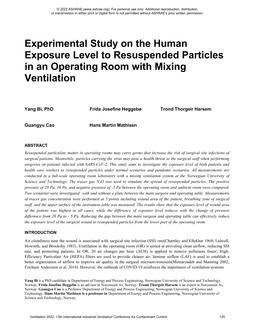
020 — Experimental Study on the Human Exposure Level to Resuspended Particles in an Operating Room with Mixing Ventilation
- Comments Off on 020 — Experimental Study on the Human Exposure Level to Resuspended Particles in an Operating Room with Mixing Ventilation
- ASHRAE
Click here to purchase
Resuspended particulate matter in operating rooms may carry germs that increase the risk of surgical site infections of surgical patients. Meanwhile, particles carrying the virus may pose a health threat to the surgical staff when performing surgeries on patients infected with SARS-CoV-2. This study aims to investigate the exposure level of both patients and health care workers to resuspended particles under normal scenarios and pandemic scenarios. All measurements are conducted in a full-scale operating room laboratory with a mixing ventilation system at the Norwegian University of Science and Technology. The tracer gas N2O was used to simulate the spread of resuspended particles. The positive pressure of 20 Pa, 10 Pa, and negative pressure of -5 Pa between the operating room and ambient room were compared. Two scenarios were investigated: with and without a plate between the main surgeon and operating table. Measurements of tracer gas concentration were performed at 5 points including wound area of the patient, breathing zone of surgical staff, and the upper surface of the instrument table was measured. The results show that the exposure level of wound area of the patient was highest in all cases, while the difference of exposure level reduces with the change of pressure difference from 20 Pa to – 5 Pa. Reducing the gap between the main surgeon and operating table can effectively reduce the exposure level of the surgical wound to resuspended particles from the lower part of the operating room.
Product Details
- Published:
- 2022
- Number of Pages:
- 8
- Units of Measure:
- Dual
- File Size:
- 1 file , 1.1 MB
- Product Code(s):
- D-IIVC2022-C020
- Note:
- This product is unavailable in Russia, Belarus

